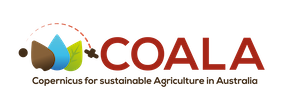The Future of Farming: Combining Local Knowledge and Precision Agriculture

The Future of Farming: Combining Local Knowledge and Precision Agriculture
- May 21, 2023
- UNSW
- Blog
- No Comments
Precision agriculture is a rapidly evolving industry that requires constant innovation to meet growing market demands. AgTech companies like COALA partner AGRISAT are leading change as advancements in remote sensing technology, and data analysis have allowed for more precise and efficient farming practices. Although these organisations are adept at communicating online, there is no better way to improve an AgTech product than evaluations in the field and face-to-face feedback from growers and end users. AGRISAT visited Australia in February 2023 to gather local knowledge from farmers about COALA’s products and evaluate their responses and experience to improve COALA services.

COALA team members from the University of Melbourne and AGRISAT visited farms near Shepparton, Victoria. They met with growers Ray, Craig and Russel to evaluate the utility of COALA’s products on Victorian farms in the Goulburn Valley region. The team found common ground in trading travel stories and a passion for sustainable growing practices despite some challenging weather.
As the AGRISAT team were visiting from Spain, they shared stories of past travel experiences and the farmers’ experiences of previous trips to Madrid and Barcelona. After bonding over farming and food in Spain, the AGRISAT team were eager to understand the grower’s experience of the COALA product.
Local Knowledge
The group used tablets and printed maps to discuss the yield variations in different paddocks and uneven crop conditions within each paddock. The AGRISAT team were enthusiastic about the local knowledge that enhanced their interpretations. Interestingly, in one of their conversations, the crop yield maps revealed a patch of lower yield in one paddock. The farmers immediately recognised that an old building once stood there. Farmers replaced the topsoil with a different soil type after the building was demolished. This positively affected crop yield. Similarly, when the AGRISAT team could not explain some inconsistencies in the maps, the farmers pointed out that the slope of the land was a factor in the crop yield. Farmers shared their local knowledge and insights with the visiting team, underscoring how working with the community and ground-truthing interpretation is crucial to the success of this kind of project.
Ray, Craig and Russel shared their experiences of the recent Victorian floods and how that negatively affected their crops. In 2021 and 2022, Australia was hit by unprecedented rainfall, resulting in 1 in 100-year flooding in the region. By the end of 2022, over crops 3000 farm animals and 120,000 hectares of crop were lost to the flooding. Despite the devastation caused by the floods, the farmers were fortunate that their maize seeds were above ground level. This meant the seeds could still be harvested once the floodwaters receded. Other farmers who didn’t plant maize weren’t as lucky. The AGRISAT team also showed how their graphs corroborated this local knowledge and revealed a decline in yield in some paddocks due to bad weather and rust. The maps and the explanations given by the AGRISAT team aligned with the farmer’s generations of expertise, reinforcing user confidence in the system.

Irrigation
The AGRISAT team also explained how they use satellite images to monitor when plants need irrigation and how much they need. In Spain, water authorities use this information to detect over-consumption of water. Water authorities penalise farmers who over-irrigate by giving them less water in the following season. For Russel, this is a familiar story. He shared how he formed a union with other farmers to combat water over-consumption in the upstream areas of the Murray-Darling basin. Water non-compliance costs the economy billions of dollars annually, including water quality degradation, lost agricultural production, and health impacts. Combining local knowledge and engagement with earth observation is valuable for combating water non-compliance.
Overall, the visit was a success, with the AGRISAT teams gaining valuable insights and feedback from the farmers. While remote working and online collaboration are essential for any international organisation, the learnings from this trip exemplify the importance of fieldwork and stakeholder engagement. Furthermore, by sharing their experiences and local knowledge, the farmers demonstrated the importance of collaboration and communication in achieving sustainable and successful agriculture.

